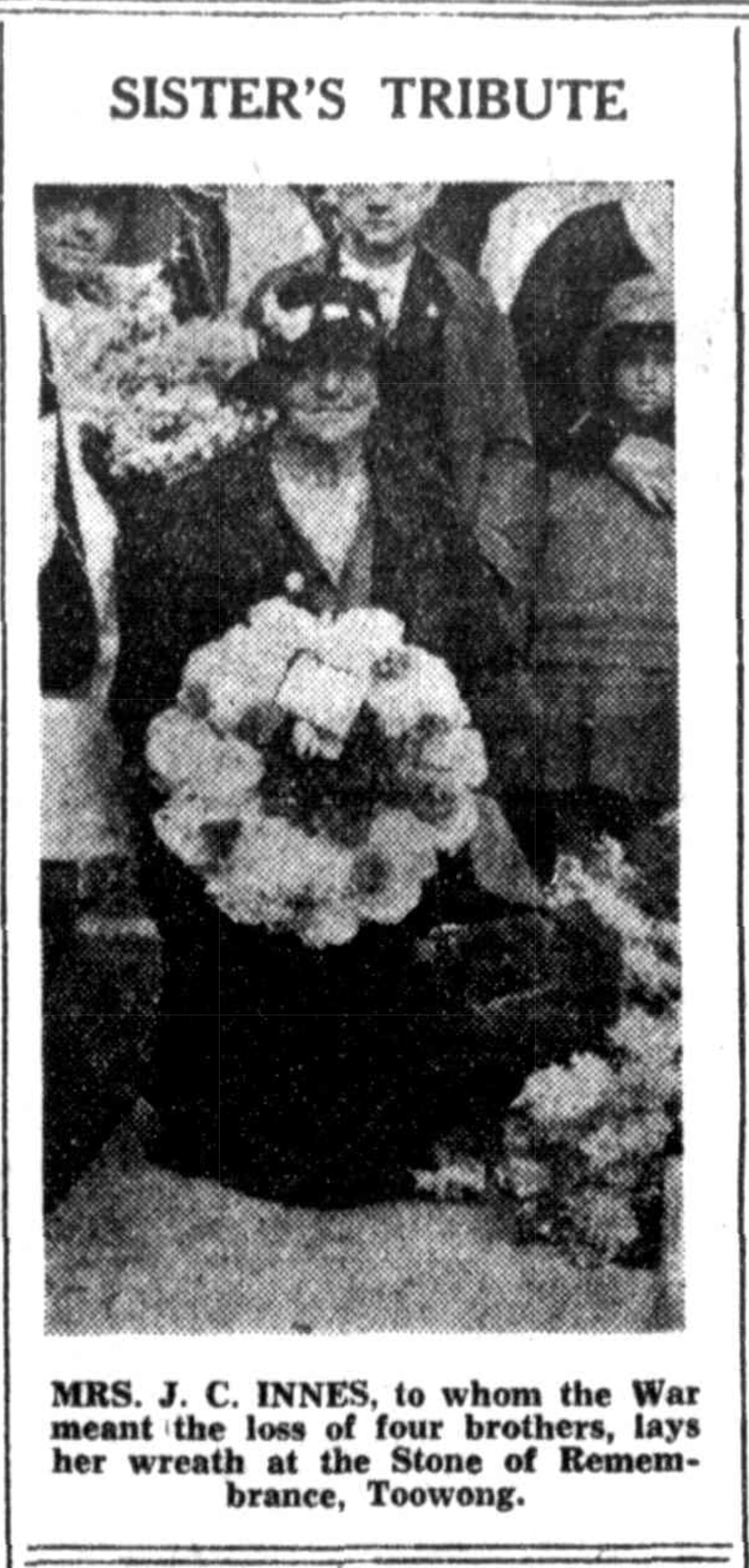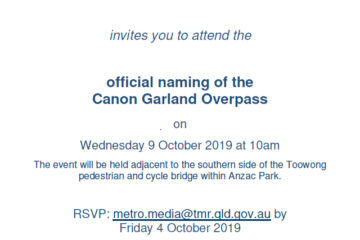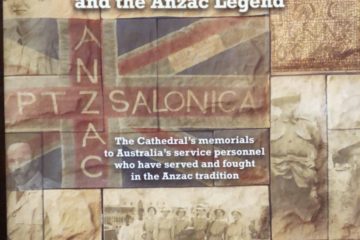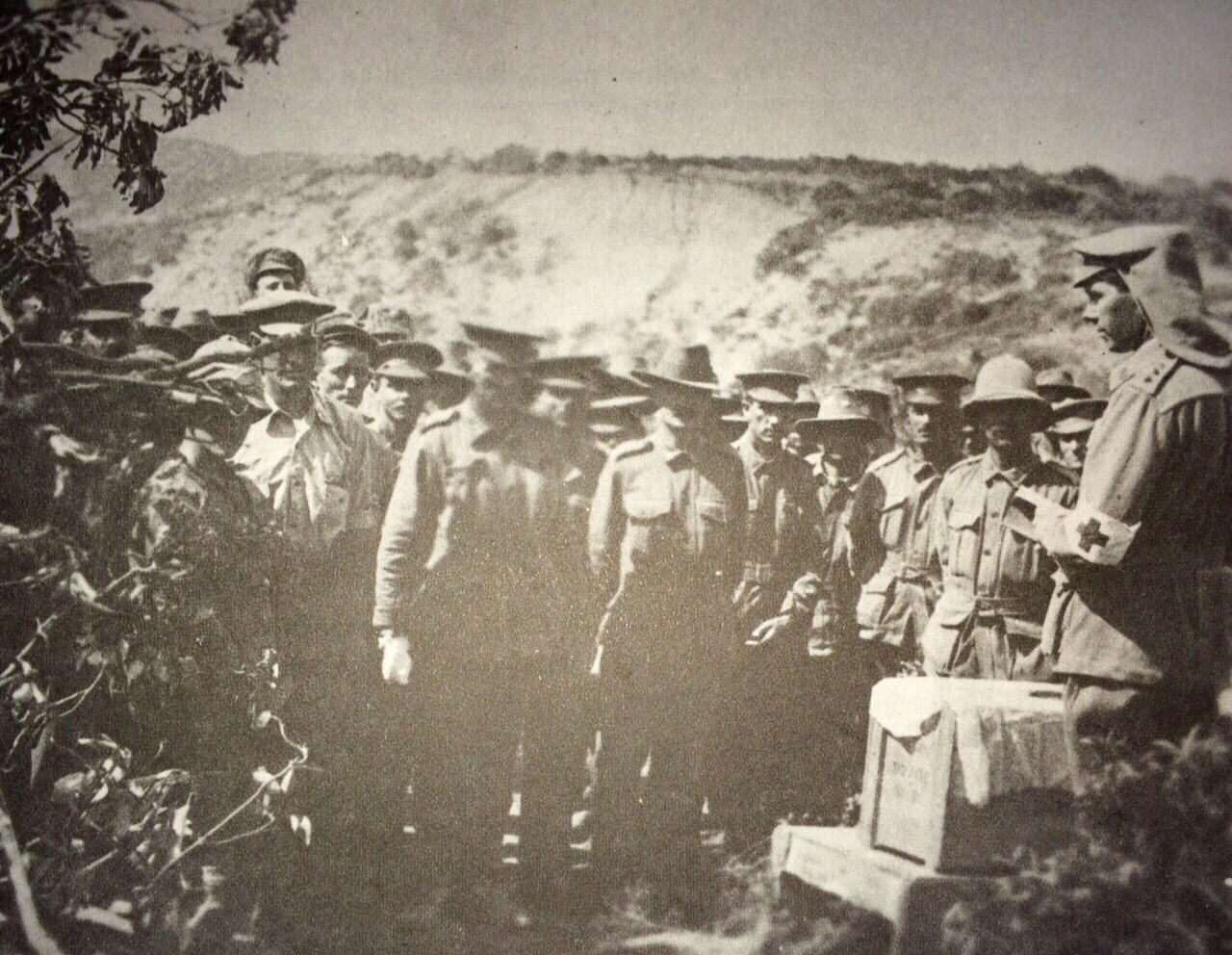ANZAC Day No.19

ABOVE: The caption reads: “Mrs J.C. Innes, to whom the War meant the loss of four brothers, lays her wreath at The Stone of Remembrance, Toowong.” This image appeared on page 6 of “The Telegraph” on Anzac Day 1935.
HEROISM. ENDURANCE. SACRIFICE.
Stone and Cross of Remembrance.
National Holy Day.
Heroism, endurance, sacrifice – these were the Anzac qualities which Canon D.J. Garland [ David John Garland ] stressed in his address to the large gathering which assembled around the Stone of Remembrance and the Cross of Remembrance at Toowong Cemetery this morning.
THE morning was a beautiful one, the soft autumn sunshine was fileted through the foliage of the tall pine trees and silky oaks in the tops of which birds warbled as did the birds on the western front amidst the shrieking of shot and shell, and the setting generally was an ideal one for such a ceremony.
As the morning progressed the bases of two sister monuments were covered with a profusion of chrysanthemums, roses, artificial poppies, cactus and other dahlias, marigolds and various other flowers, as well as by occasional wreaths of croton leaves, ivy and other foliage.
LOYAL ORANGE WREATH.
An unusual feature of the service was the laying on the monument of a wreath by The Loyal Orange Institution Grand Council of Australasia, now in Brisbane.
The wreath was laid by M. Wor. Bro. [ Most Worshipful Brother ] C.A. Willoughby, Grand President.
Among the officers was R. Wor. Bro. [ Right Worshipful Brother ] J.R. Dell, Queensland president, and delegates to the Australasian Grand Council biennial meeting.
The Commonwealth Government, was represented by Mr. J.A.J. Hunter [ James Aitchieson Johnston Hunter, Federal Member for Maranoa ] (Assistant Postmaster-General), Mr. G.W. Watson (Under-Secretary of the Chief Secretary’s Department) [ George William Watson ], represented the Premier (Mr. W. Forgan Smith) [ William (“Bill”) Forgan Smith, M.L.A., State Member for Mackay], and Mr. J.F. Maxwell, M.L.A., [ James Francis Maxwell, M.L.A., Member for Toowong ] represented the Leader of the Opposition (Mr. A.E. Moore) [ Arthur Edward Moore, M.L.A., Member for Aubigny ].
Alderman H. Massey was the representative of the City Council [ Harry Massey became the State Member for Toowong in 1938 ].
Amongst ex-service men present were Major H.M. Maddock, V.D. [ Volunteer Detachment ], of the 9th Battalion [ Herbert Mark Meadows Maddock, a veteran of the Boer War ], and Lieutenant G. Light [ George Light ] of the first division of the 3rd Brigade, A.F.A. [ Australian Field Artillery ]; Messrs. J.W. Wood (president), S.H. Richardson (hon. general secretary) [ Samuel Henry Richardson, see footnote ], and C.W. Walker (councillor) represented The Fathers’ Association [ The Sailors’ and Soldiers’ Fathers’ Association ].
The procession, headed by the cross-bearer, marched from the gates to the stone, singing to the tune, ‘Rock of Ages’, the litany, commencing with the lines:—
‘God the Father, God the Son.
Holy, Ghost the Comforter.
Ever blessed. Three in One.
Hearken to our humble prayer.’
HOLY DAY, NOT HOLIDAY.
“Once again,” said Canon Garland, “I want to express appreciation of the way in which the people of Queensland show their determination to keep Anzac Day a holy day and not to allow it to become a mere holiday.
“The observance of Anzac Day was initiated in Queensland, which thus gave a definite lead to the sacred commemoration of the day and of its relation to ail those who laid down their lives – 60,000 Australians – for us all, and not only for those who fell in the war but also those who mourned at home.
“It is fitting that the memory of that heroism, endurance and sacrifice will not be allowed to fade, and this large assemblage which is only one of countless others which will be held throughout this land today, is evidence that the people of Australia will not let its sacredness diminish or forget its meaning as the years roll by.
“For all time Anzac Day will be a national day, a holy day, but not a holiday.”
ACHIEVING THE IMPOSSIBLE.
The speaker briefly pictured the scene at Anzac and Gaba Tepe beaches on the first Anzac Day, and pointed out that the Australian and New Zealand soldiers there had achieved what seemed to be humanly impossible in wading their way through the shallow waters, scaling the precipitous cliffs with their barbed wire entanglements and forcing the cream of the Turkish army under skilled German officers to give them a footing on hostile soil.
“What was the cost?” asked Canon Garland. “Two thousand five hundred Australians and New Zealanders were killed and 7,000 were wounded, making a total of 10,000 casualties in about 18 hours on that unforgettable day.”
“What would have happened had Germany won the war,” said the speaker, “may be imagined from her treatment of those who, though born within her borders were of a different faith.
If they have suffered this, how would we have fared who are of another nationality and who were their enemies?”
At the conclusion of the ceremony Bugler Sergeants, H. Barnes, of the 17th Battalion [ Herbert (“Jerry”) Barnes ], B. Devlin, of the 5th Light Horse [ Driver Bernard Mervyn Devlin ], and A.E. Jackson, of the 52nd Battalion, assisted by Drummers, A. McLelland and R.C. Mitchell, of the Scottish Pipe Band, sounded “The Last Post”.
– from page 6 of “The Telegraph” of Saturday, 25 April 1935.


